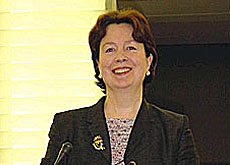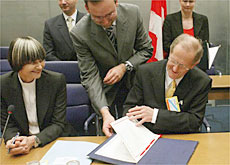Game over for bilateral approach to EU relations

The Swiss should not bank on any more bilateral treaties with Brussels, according to the head of the European Parliament’s delegation responsible for relations with Switzerland.
European parliamentarian Diana Wallis told swissinfo the second set of accords signed this week would almost certainly be the last.
More than two years of often tortuous negotiations between Bern and Brussels formally came to an end on Tuesday after both sides signed a package of nine agreements.
The treaties, which still need to be ratified by the Swiss parliament, cover the taxation of savings income, customs fraud and the Schengen/Dublin agreement governing security and asylum cooperation.
Switzerland will also be able to participate in various European Union programmes in the fields of agriculture, statistics, pension schemes and the environment.
While EU membership remains the Swiss government’s long-term objective, ministers are not ruling out the possibility of future negotiations on more bilateral agreements.
But Wallis maintains that the 25-member EU no longer regards Switzerland as a special case – and that the country must decide if it is in or out of Europe.
swissinfo: The Swiss have hinted that they would like to continue along the bilateral way. Will there be a third round of accords?
Diana Wallis: Sitting where I am now, that looks highly unlikely to impossible. We’ve got over 150 different sorts of bilateral agreements with Switzerland and we simply cannot continue down this route. You cannot go on picking bits out here and there, it’s just not feasible – especially when you consider that the EU is continually moving forward and is increasing its own sphere of activities among its member states.
swissinfo: So the message from Brussels is that Switzerland is no longer a special case?
D.W.: I think that probably has to be right, because you can’t go on making exceptions in this way. A good section of the internal market has been opened to Switzerland, and there isn’t a great deal of room to go much further on a piecemeal basis. And to be quite honest I don’t think it’s actually even in Switzerland’s interest to continue in this half-in, half-out zone.
swissinfo: Assuming the EU wanted to pursue the bilateral approach, are there even any dossiers left to negotiate?
D.W.: Not really. Switzerland has taken the basic bits and the EU’s point of view is that if you start going much further, you might as well be applying for membership.
The only major dossier still outstanding is the one governing services, something which was left out of the second set of bilaterals.
But Brussels is currently implementing a very extensive directive on services, so we are moving even further away from Switzerland – and the Swiss were already having difficulty with this. So I think it’s really going to prove very difficult to do anything more along the bilateral route.
swissinfo: You were elected last month as head of the delegation at the European Parliament with responsibility for relations with Switzerland. What are your priorities going to be over the next five years?
D.W.: My main priority will be to provide a channel for Swiss parliamentarians to communicate with our parliament and with the democratic part of the EU. But I’ll also be working on something which has been an irritation on both sides for a number of years: and that is why the European Commission does not have a proper representation in Bern. This would vastly improve the nature of our relationship.
We did get a budget allocation for this last year, but then the Commission chose to open offices in Havana and Wellington, and somehow it didn’t happen in Switzerland. So we have to get to the bottom of this and show some political will to make it happen.
swissinfo: You mention Havana and Wellington. Does that mean the EU is more interested in exploring ties with Cuba and New Zealand than with Switzerland?
D.W.: No, that would be unfortunate. Switzerland is one of our biggest trading partners, is a neighbour and encircled in Europe, so it’s a country of great importance [to us] and it’s a relationship that we would like to see work well. And I think that a European Commission office in Bern would greatly assist the development of this relationship.
It would allow us to have people permanently based in Bern next to the Swiss government, who would be aware on a daily basis of what’s going on. We would no longer have to rely on hearing things second- or third-hand. From the Swiss perspective, it would give businesses and individuals direct access to the EU, so I see this very much as a two-way process that could be beneficial for both sides.
swissinfo-interview: Ramsey Zarifeh
British MEP Diana Wallis was elected president of the European parliamentary delegation to Switzerland, Iceland and Norway in September 2004.
She has recently published the second edition of her book, “Forgotten Enlargement: Future EU relations with Iceland, Norway and Switzerland”.
She won a second term in Strasbourg in 2004.

In compliance with the JTI standards
More: SWI swissinfo.ch certified by the Journalism Trust Initiative

You can find an overview of ongoing debates with our journalists here. Please join us!
If you want to start a conversation about a topic raised in this article or want to report factual errors, email us at english@swissinfo.ch.